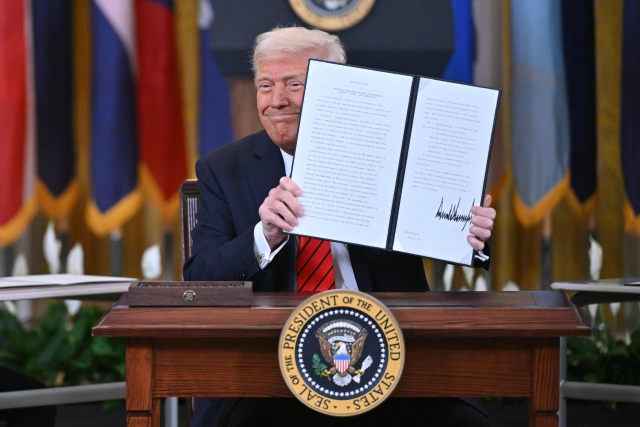
U.S. President Donald Trump signed an executive order aimed at shutting down the Department of Education during an education event in the East Room of the White House in Washington, D.C., March 20, 2025. (Photo: CFP)
The U.S. Supreme Court recently lifted a lower court injunction, allowing the Trump administration to move forward with its plan to dismantle the Department of Education, a decision that has triggered disputes and could affect millions of students who rely on federal loans and grants.
The ruling removes a key legal barrier that had blocked nearly 1,400 planned layoffs and the outsourcing of programs once overseen by the Department. President Donald Trump has long pledged to downsize federal oversight of education and shift responsibilities to state governments and other federal agencies.
The decision triggered swift backlash from education advocates and legal experts. Democracy Forward, an organization formed in 2017 that has brought more than 100 court cases during the first Trump term, called the move "a devastating blow to this nation's promise of public education for all children."
Financial aid in jeopardy
Unlike education ministries in other countries, the U.S. Department of Education does not operate schools or set curricula—those powers reside with state and local authorities.
However, the Department plays a critical federal role in administering student aid, enforcing civil rights protection, and distributing grants. Each year, it supports roughly 13 million students through more than $120 billion in grants, work-study funds, and low-interest loans.
Under Trump's restructuring plan, that support is at risk.
According to government budget data, funding for the Department's Office of Federal Student Aid plummeted from $179.65 billion in fiscal year 2024 to just $94.9 billion in 2025. The sharp decline reflects the increasing financial pressure on federal aid programs under Trump's policies.
Meanwhile, the cost of higher education continues to rise. The average tuition and fees at ranked private colleges increased by approximately 5.5% between the 2023-2024 and 2024-2025 academic years, according to U.S. News.
For low-income students, federal aid programs like the Pell Grant and the SAVE plan have long been essential. Critics now warn that dismantling the Department could make college less accessible for those who need help the most.
The administration says the goal is to streamline operations. In an executive order, Trump argued that the Department "is not a bank" and should relinquish control over its loan portfolio, comparing its balance sheet to that of Wells Fargo. He proposed moving loan management to other agencies that are better equipped for financial oversight.
But education advocates argue that the plan does little to ease the burden on borrowers, noting that it makes little difference which agency oversees the loans—the debt and the challenges of repayment remain unchanged.
Civil rights protection at risk
The Department of Education was created in 1979 by then-U.S. President Jimmy Carter. It remains the smallest Cabinet-level agency, with just over 4,000 employees. In fiscal year 2024, its budget allocation totaled $238 billion, accounting for less than 2% of the total federal budget.
Still, the Department's role in enforcing civil rights laws—aimed at preventing discrimination based on race or sex in federally funded schools—and its support for marginalized students, including those with disabilities or facing bias, have made it crucial for educational equity.
In a sharply worded dissent, U.S. Supreme Court Justice Sonia Sotomayor, a member of the Court's liberal wing, warned that dismantling the Department could have severe repercussions.
"Lifting the District Court's injunction will unleash untold harm, delaying or denying educational opportunities and leaving students to suffer from discrimination, sexual assault, and other civil rights violations without the federal resources Congress intended," she wrote.
Republicans have long argued that education should be controlled at the local level and that the federal government's involvement amounts to overreach.
But critics say the Trump administration's plan goes beyond decentralization and reflects a broader ideological agenda, an accusation echoed by political analyst Richard Angwin, who argued on X that the effort is driven more by Trump's allies' "vendettas" than by coherent policy.
Reporter | Liu Xiaodi, Lin Ying (intern)
Editor | Yuan Zixiang, James, Shen He

















